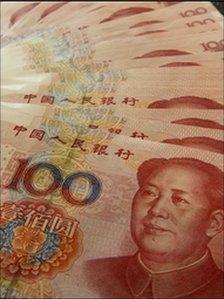IMF says Chinese banks face risks, urges quick action
- Published

The IMF conducts reviews every five years into the financial sectors of key economies
The International Monetary Fund (IMF) has warned that China's financial system "faces a steady build up in vulnerabilities".
In a review, external, publicly released on Tuesday, the IMF said that banks were robust enough to withstand isolated shocks.
But not, it said, combined exposure to credit, property and currency risks.
The IMF has urged reforms, including allowing banks to rely more on market mechanisms such as interest rates.
"China's banks and financial sector are healthy, but there are vulnerabilities that should be addressed by the authorities," said Jonathan Fiechter, the head of the IMF team that conducted the review.
The IMF has recommended the Chinese government play less of a role in the banking system, and allow lending decisions to be based on commercial goals.
The current system has encouraged over-investment and fuelled asset bubbles, said the IMF.
"While the existing structure fosters high savings and high levels of liquidity, it also creates the risk of capital misallocation and formation of bubbles, especially in real estate," said Mr Fiechter.
The review said that this has lead to "low investment efficiency".
Since 2001, China has invested 40% more for every $1 of gross domestic product growth than Japan and South Korea did when they were in the same period of development, according to the report.
The IMF's first Financial Sector Assessment Program review was carried out jointly with the World Bank. China is one of 25 key economies that have agreed to mandatory assessments at least once every five years.
The lender, together with Chinese authorities, conducted stress tests on 17 commercial banks in the country.
- Published14 November 2011
- Published14 November 2011